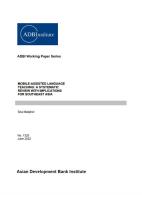Immediate Steps that Asia–Pacific Governments Can Take to Decarbonize via the Cloud

Head of Public Policy, Asia Pacific and Japan, Amazon Web Service

Asia–Pacific countries should set ambitious decarbonization goals, and collaborate with the private sector to achieve them. Photo credit: Courtesy of AWS.
Cloud computing can accelerate innovation on the path to net-zero carbon.
This story is published in collaboration with Amazon Web Services.
The recent Intergovernmental Panel on Climate Change (IPCC) report, a sobering “code red for humanity,” shows just how much—and how quickly—we need to change to mitigate the worst effects of climate change. Leaders around the world are gearing up to raise the bar on climate ambition at the United Nations Climate Change Conference (COP26) next month, and even in Asia–Pacific (APAC) we have seen governments, companies, and organizations of all sizes seeking to fast-track their digital transformation and decarbonization efforts. A good example of this is Japan, which not only established the Digital Agency this year, but also established a roadmap to reach net-zero carbon by 2050. Singapore’s Green Plan 2030 also calls out the need for green digital transformation as part of sustainable development.
In APAC—home to nearly 60% of the world’s population, 100 of the most polluted cities, and challenging markets for renewable energy investment—it is vital that digital strategies reinforce sustainable development, and vice versa. Amazon has supported similar efforts in Europe, where the European Commission approaches digitalization and decarbonization as mutually reinforcing "twin transitions," and we stand ready to do the same across the region.
At Amazon Web Services, we see cloud computing as enabling accelerated innovation on the path to net-zero carbon. That is why we recently hosted our first public webinar, “Meeting Sustainability and Climate Goals with the Cloud in APAC,” bringing together industry, government, and other key stakeholders, and featuring experts from 451 Research, Environment Resource Management, Intel, Singapore’s Economic Development Board, and AWS customers DBS Bank and Canva. Collaboration was the key takeaway from this event—tackling climate change through partnerships across businesses, public sector, academia, and finance is the way forward.
Decarbonizing with cloud technology
A recent study by 451 Research estimates that cloud infrastructure is five times more efficient than APAC on-premises data centers, such that moving IT workloads to the cloud would immediately reduce energy use and associated carbon emissions by 78% across APAC. This is a significant sustainability advantage that can be capitalized on today. To dramatically and rapidly reduce the carbon footprint of public and private sector IT workloads, we urge policymakers to prioritize clear and effective cloud-first, cloud-native, and cloud migration policies today.
Moving to AWS is also much more sustainable than on-premises infrastructure because AWS has always focused on energy efficiency and continuous innovation in its data centers. For example, we removed the large central Uninterruptible Power Supply (UPS) from our data center design, instead utilizing small battery packs and custom power supplies that we integrate into every rack. This has improved our power efficiency, further increased availability and has helped us reduce energy conversion loss by about 35%.
We are also working to reduce the embodied carbon—the carbon dioxide emissions associated in making and using a product or service—of new data centers. By reducing the cement content in our concrete and sourcing steel from electric arc furnace mills, we can reduce the embodied carbon in the structure of our data centers by at least 20%. These requirements will be standard in our AWS-operated data centers by the end of 2021.
Innovating for sustainability on the cloud
In APAC, AWS already supports countless examples of cloud-enabled, customer-led sustainability innovation, including in waste management, with Republic of Korea company ECube’s use of AWS machine-learning (ML) analytics to maximize smart trash bin technologies’ capacity and minimize emissions from transportation and logistics. Another great example is in water utilities and management, with WeGOT Utility Solutions’ use of AWS Internet of Things (IoT)-enabled smart water tracking to save billions of liters of water from going down the drain in India and beyond.
There is also tremendous potential for power utilities to decarbonize with cloud technology, particularly for energy management. Digital technologies can also help utilities improve operating costs, find new revenue streams, enhance safety, and support net-zero goals. For example, Vector is using AWS IoT, ML and big data analytics to facilitate efficient grid management and better integrate clean energy across Australia and New Zealand. Similarly, TRENDE in Japan is using AWS Cloud to expand solar power offerings and establish peer-to-peer electricity trading for Japanese residential customers.
Unlocking renewable energy for APAC
The IPCC recognizes that renewable energy has tremendous potential in mitigating climate change, and renewable power plays a central role in Amazon’s own decarbonization strategy. However, considerable decarbonization opportunity remains in APAC, where corporate renewable energy investments prove challenging due to limited availability, undue regulatory complexity, and high costs. To encourage greater availability and affordability of corporate renewable energy options regionally, we actively work with organizations such as the Japan Climate Leaders Partnership (JCLP), Renewable Energy Demand Enhancement (REDE) initiative in India, and Clean Energy Investment Accelerator (CEIA) in Indonesia, among others.
Aligned with these groups, we support regulatory frameworks that incentivize varied, affordable, and additional renewable power purchasing options, beyond what is available on the grid today. And we encourage market structures enabling direct procurement between suppliers and corporate consumers, and supporting credible and transparent issuing, tracking, and certifying of competitively priced Renewable Energy Certificates or similar instruments.
In 2020, Amazon became the world’s largest corporate purchaser of renewable energy, with more than 230 renewable energy projects generating over 10 gigawatts of capacity globally to date putting us on a path to powering our global operations with 100% renewable energy by 2025. In APAC, our utility-scale solar and wind project investments in Australia, the People’s Republic of China, Singapore, and most recently Japan, are bringing new approaches and associated capital, green jobs, and technology across APAC.
Setting ambitious targets and investing in low carbon solutions
Addressing the climate crisis requires both bold commitments and everyday actions. We welcome the increasingly ambitious climate targets seen across APAC today, look forward to even greater ambition going forward, and encourage public–private collaboration and partnership to accelerate these efforts ahead of the Paris Agreement timeline.
This is why Amazon co-founded The Climate Pledge in 2019, which now has over 200 signatories, including Canva, Greenko, Macquarie Asset Management, and Xero from APAC. We stand ready to support similar ambitions by regional governments, including through Amazon's Sustainability Data Initiative, with open access to climate-related data sets (from NASA, the UK Met Office, and the Japan Meteorological Agency, among others), plus free AWS credits, support, and training for researchers and scientific organizations tackling climate challenges.
Climate finance and investments in decarbonizing technologies also play an important role on our path to net zero. We commend organizations such as the Asian Development Bank who have increased focus on climate finance, have set big bold targets and have delivered on their commitments. This is why Amazon launched The Climate Pledge Fund in 2020 to support the development of sustainable and decarbonizing technologies and services. This dedicated investment program—with an initial $2 billion in funding—invests in visionary companies whose products and solutions will facilitate the transition to a low-carbon economy.
For example, Ion Energy is a software developer based in Mumbai and Paris that provides advanced battery management solutions to owners and operators of battery fleets used in stationary and mobile applications. Ion Energy’s software and modeling tools provide a look into the state of life of those batteries, and improve the way batteries are charged and drained for maximum value. Amazon operates batteries across our operations and we believe energy storage will play an important role in achieving net-zero carbon.
At Amazon, we remain relentlessly optimistic about the future. We know that much more is required to accelerate paths to net-zero carbon in APAC, but we see the cloud as a crucial catalyst. Alongside innovation and collaboration, supportive policies for the adoption of digital technologies to tackle climate change, and ambitious targets in the region, will help us realize our net-zero ambitions in APAC.
This story was first published on AWS on 10 October 2021.

Quint Simon
Head of Public Policy, Asia Pacific and Japan, Amazon Web ServiceQuint Simon serves as head of public policy for Asia Pacific and Japan at Amazon Web Services (AWS). In this capacity, she leads AWS’s engagements with policymakers and regulators across the Asia Pacific on policy issues related to the adoption of cloud computing and emerging technologies. She is co-chair of the Asia Cloud Computing Association and has deep expertise in cross-border data flows, cybersecurity, privacy and data protection, and digital trade.

Amazon Web Services (AWS)
Since 2006, Amazon Web Services has been providing world-leading cloud technologies that help any organization and any individual build solutions to transform industries, communities, and lives for the better.
